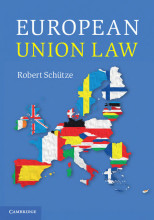Summary: European Union Law | 9781107071209 | Robert Schütze
- This + 400k other summaries
- A unique study and practice tool
- Never study anything twice again
- Get the grades you hope for
- 100% sure, 100% understanding
Read the summary and the most important questions on European Union Law | 9781107071209 | Robert Schütze
-
1 Overzicht studiestof European Union Law
-
1.1 Judicial Powers & Procedures
-
Art. 263 TFEU entails the judicial review. What are the requirements for the non-privileged group to bring an action for judicial review?
There are three possibilities according to art. 263(4) TFEU:- Acts are addressed to that person. Applicant can challenge.
- Regulatory acts that does not need implementing measures. Person must prove direct concern. See Inuit II-case paragraph 56 and 3.
- Not regulatory acts. Person must show direct and individual concern. Individual concern, see Plaumann.
-
What are regulatory acts, and in which case this is explained?
The definition is given in Inuit-I. Regulatory acts all acts of general application apart from legislative acts. -
What are the options if the Court decides that an act is not admissible for direct review?
An applicant can challenge the legality of an act indirectly. The possibilities are:
1. Plea of illegality, Art. 277
2. Preliminary reference procedure, Art. 267 -
What are the pros of the procedure laid down in Art. 277 TFEU
Pros
1. The individual can bypass the two-month limit
2. They can challenge acts that require further implementation -
What are the pros and cons of the procedure laid down in Art. 267 TFEU?
Cons1. Can only be used if the national court has the jurisdiction
2. Applicant need to breach European Law before challenging the legality
3. Individual applicants have no right to demand the indirect review of Union law by the European Court. -
What are the requirements for a preliminary ruling of Art. 267(2)?
The provision allows any court or tribunal to ask a preliminary question that is necessary. The requirements are thus:
1. Any court of tribunal: to define whether a body is a court depends on six criterias.- established by law
- permanent
- jurisdiction is compulsary
- its procedure is inter parties
- it applies rules of law
- it is independent
2. Necessary: The European Court encourages national courts to ask preliminary questions. Even when it is imperfectly formulated. -
What does the doctrine of Acte Clair means?
This doctrine means that when it is clear for a national court how to act, it does not need to ask a preliminary question. -
1.2.2 Fiscal Barriers
-
What are fiscal barriers?
Fiscal barriers are customs duties that are employed to protect domestic goods against cheaper imports. -
1.2.2.1 Border Measures: Art. 30
This is a preview. There are 2 more flashcards available for chapter 1.2.2.1
Show more cards here -
What is a customs duty, and in which case the Court defines this concept?
The Court defines a customs duty in Statistical Levy, para. 7, as: 'any pecuniary charge, however small and whatever its designation and mode of application, which is imposed on goods by reason of the fact that they cross a frontier'. -
Does art. 30 have justifications, and what is the difference between justification and exceptions?
Since art. 30 is an absolute prohibition, it does not have justifications. Behaviour can fall under the scope of the prohibition. However, this behaviour can be justified under circumstances.
In case of exceptions, the behaviour does not fall under the scope of the provision.
- Higher grades + faster learning
- Never study anything twice
- 100% sure, 100% understanding

































